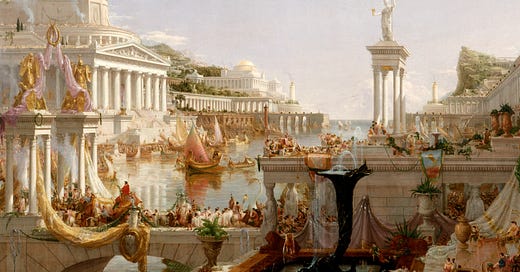The Subversive Art of Teaching Western Civ.
If education is to develop moral character and civic virtue, then students must understand the principles upon which their society is built.
One of the most common questions about classical education is this: Why does it focus so heavily on Western civilization—its history, literature, art, architecture, scientific achievements, philosophical traditions, and political systems? The simplest answer is that, for those living in the West, this tradition is the foundation of our intellectual and cultural heritage. Understanding it is essential for grasping the ideas, values, and institutions that shape our world today.
But the answer goes deeper. We are not only Westerners; as Americans, we are citizens of a specific nation that represents a distinct chapter in the Western story. If education is to develop moral character and civic virtue, then students must understand the principles upon which their society is built. This includes not only celebrating the achievements of the West but also grappling with its contradictions and imperfections—from historical injustices like slavery to modern challenges like censorship and propaganda. A true education does not ignore flaws but engages with them honestly, fostering informed perspectives and a deeper appreciation of the ideals that societies strive to uphold.
Unfortunately, in too many modern schools, the study of history and literature—Western or otherwise—has been marginalized or reduced to fragmented summaries. But one cannot fully understand modern democratic institutions without studying the Enlightenment thinkers who shaped them. Likewise, the Enlightenment cannot be understood without knowledge of the Renaissance, which in turn draws from the intellectual legacy of Greece and Rome. This intellectual continuum, spanning thousands of years, is critical to preparing students for civic life. Without it, they are vulnerable to oversimplifications and ideological distortions that prioritize contemporary perspectives over deep intellectual and moral development. The Latin phrase Scientia est Libertas (“Knowledge is Freedom”) encapsulates this belief: true freedom requires knowledge of the ideas and systems that have shaped our world.
In contrast, many public and even private schools today reject this unique heritage, instead promoting an approach that attempts to equate all cultures as equal in importance and effect on American society. While the intention behind this perspective may be to foster inclusivity, in practice, it often leads to a dilution of historical and intellectual rigor. Rather than presenting Western civilization as the primary cultural and political framework within which American students operate, many curricula sideline it under the guise of diversity. The result is a generation of students who lack a coherent understanding of the principles that underpin their own society and its institutions.
Some critics argue that focusing on the Western tradition means neglecting the rest of the world. This is a false dilemma. A well-rounded classical education embraces the contributions of non-Western civilizations as an essential part of the human story. Students of classical education study the philosophy of Confucius, the achievements of the Islamic Golden Age, the cultural innovations of ancient Egypt, and the political systems of the Chinese dynasties. The study of the West does not exclude these traditions; rather, it provides a structured framework for understanding how different civilizations have interacted and influenced one another throughout history.
Yet, while classical education values global contributions, its foundation remains rooted in the Western tradition because that is the intellectual and cultural framework students inhabit. To teach otherwise would be to sever them from their heritage, leaving them unprepared to navigate their role in its ongoing story. A powerful example of this principle comes from the study of logic. The Either/Or Fallacy, also known as the False Dichotomy, is a logical error first identified by Aristotle, a Greek philosopher who is a pillar of the Western canon. This fallacy warns against oversimplifying complex issues into false choices—such as the idea that an emphasis on the West necessarily excludes other cultures.
Ultimately, classical education aims to equip students with the knowledge and intellectual tools to understand their world and contribute meaningfully to its future. By embracing the Western tradition as a foundation, while also exploring the richness of global history and thought, this approach invites students to think critically, explore deeply, and engage fully with the ideas that have shaped human civilization. Rather than being a limitation, it is an invitation to a lifelong pursuit of wisdom and truth.
Michael S. Rose, a leader in the classical education movement, is author of The Art of Being Human (Angelico), Ugly As Sin and other books. His articles have appeared in dozens of publications including The Wall Street Journal, Epoch Times, New York Newsday, National Review, and The Dallas Morning News.






This is exactly how I taught art and philosophical/religious history for decades. I also took up the various modes of historiography all at once. Antiquarian ( detailed research), monumental (exemplary contributions done even seemingly “timeless”), critical (like a dialogue between past and present that entertains value-moral gains and losses given a sense of the Good)symptomatic (cultural shadows and pathologies), and “messianic” (redemptive from the perspective ofthe future). Mainly the first two as celebration and resource for life in an age of overly stressed senses of victimhood without being blind to injustices through the ages.